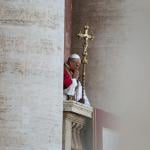A reader asks:
Quick question: Why do we have a hymn of heretic Martin Luther (“A Mighty Fortress”) in our Catholic hymnal? My protestant father sees this inclusion as implying that Holy Mother Church thinks Luther wasn’t “that bad”.
Thank you for your time and faithfulness.
We have the hymn presumably because the people who compiled the hymnal think it’s a good hymn–which it is.
The Church has always had the habit of taking the best of whatever we humans come up with and pressing it into the worship of God. It has never been afraid to borrow from Protestants (lots of good hymns there, for instance, particularly at Christmas. We would be a poorer Church without “Hark, the Herald Angels Sing” or “It Came Upon a Midnight Clear” as well as the many other good and beautiful hymns by Protestant composers. The Church does not believe we contract ritual impurity cooties by contact with non-Catholics. Not just Protestants, but pagans, and Muslims have contributed to Catholic thought, faith, and culture. So St. John cribbed the idea of the Logos from Greco-Roman platonic philosophy to describe Jesus. St. Paul turned gnosticism on its head by stealing a gnostic code word to describe Jesus as the “fulness” of God. He did not thereby bestow his apostolic blessing on gnosticism any more than Moses conferred a blessing on Egyptian paganism when he allowed Israel to accept gifts from Egyptians at the Exodus. Similarly, St. Thomas used the thought of the pagan Aristotle and the Muslim Averroes and reconciled them (and corrected them) with the Christian tradition. All truth and beauty belong to God. So when Luther writes a good hymn, the Church sings it with gusto. Doesn’t mean the Church is signing off on everything Luther said any more than St. Thomas is declaring “There is no God but Allah and Mohammed is his Prophet” when he cites Averroes or proclaiming faith in Zeus and Athena when he quotes Aristotle.















